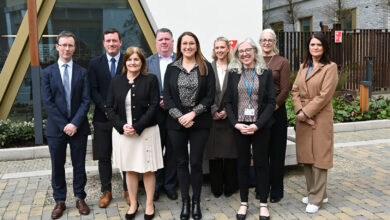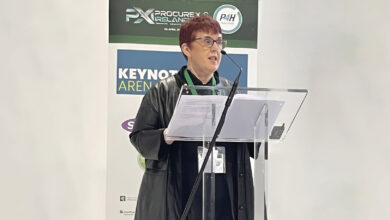Procurement Minister Emer Higgins TD: ‘Making public procurement more open and transparent’

Minister of State with responsibility for Public Procurement, Digitalisation and eGovernment, Emer Higgins TD, speaks with eolas Magazine about the development of the first National Public Procurement Strategy for Ireland.
eolas Magazine (EM): Why do we need a new National Strategy for Public Procurement?
Minister of State Emer Higgins (MoS EH): The 2025 Programme for Government: Securing Ireland’s Future includes a commitment to reviewing the public procurement process to make it more transparent and support greater participation from SMEs in Ireland. According to European research, every year in the EU, over 250,000 public authorities spend around €2 trillion (around 13.6 per cent of GDP) on the purchase of services, works, and supplies.
This is a very significant amount of money, in Ireland it amounts to several billion euro each year. We have an obligation to ensure that this money is spent strategically, in a way that works for indigenous industry, for SMEs, micro enterprises, and for social enterprises.
I am passionate about supporting SMEs because I see their value at every stage of my life and career. I grew up watching my mother run a small business, I worked in the corporate world with PayPal, and later, as Minister of State for Business, Employment and Retail, I met business owners across the country. I saw first-hand not only the challenges they face every day, but also the vital role they play in driving employment, supporting communities, and strengthening our economy. They are the backbone of local enterprise and deserve real opportunities to thrive, including fair access to public procurement.
By procuring from social enterprises, a public body can use some of the money spent to improve access to employment for people with disabilities or other marginalised groups. Green public procurement can also be a tool to support government’s wider climate ambitions and the transition to a circular economy.
EM: What will this mean for public servants involved in public procurement?
MoS EH: One of the foundational policy positions of the strategy is to better equip public buyers to access the markets they depend on. This includes a focus on strengthening skills and confidence across the system. I am very aware that many public servants who procure are not procurement specialists. They are focused on delivering essential public services and procure goods and services as part of that wider role. That is why my department has been engaging with public buyers from across the sector to understand their main challenges and to work with them on practical solutions to improve how procurement is carried out.
Challenges brought about by crises such as the Covid-19 pandemic and Brexit have demonstrated the public sector’s resilience and ability to adapt to changing global circumstances. Public buyers have had to show significant levels of agility to enable continuity of supply and service.
“Each euro that we spend on goods, services, and works has the possibility to bring far-reaching social and environmental benefit.”
Minister of State with responsibility for Public Procurement, Digitalisation and eGovernment, Emer Higgins TD
The pandemic had the dual effect of putting pressure on the supply of contracted goods and services while giving rise to new, previously unforeseen but highly sought after requirements, particularly in the area of PPE. Global competition for resources in the early stages of the crisis was fierce.
It was the professionalism, experience, and expertise of procurement practitioners that helped the country navigate its way through the crisis. By leveraging the shared experience and expertise of public buyers, I am keen to explore ways to expand the focus on resilience in the procurement system, building on the work undertaken to date, to prepare for any future challenges.
Public procurement projects are often complex and, as we have seen, even the best planned projects can be impacted by unforeseen circumstances. In this context, public servants need to be equipped with commercial skills to address these challenges in a timely and effective fashion. Through the strategy, we are keen to explore ways to train, retain, and develop talent and skills across the public procurement landscape.
Ensuring that public buyers and policy makers have the necessary skills and knowledge to deliver on the agreed actions will be crucial to the successful implementation of the strategy and I will work with colleagues across government to support this objective.
EM: How will the strategy seek to ensure greater participation from SMEs in the public procurement process?
MoS EH: Public procurement has significant potential to support SMEs and, with it, regional development, and the wider economy. The award of a public contract can act as a springboard for emerging micro-enterprises and SMEs to expand and export. I am aware of the growing network of social enterprises that have the capability to deliver a vast, and expanding, range of goods and services. Awarding a contract to a social enterprise can maximise the societal impact of the procurement spend. With these wider economic benefits in mind, one of the foundational policy positions of the strategy is to make participation in public procurement easier for suppliers, particularly SMEs and social enterprises.
I previously served as Minister of State with responsibility for Business, Employment and Retail. I also bring with me a decade of experience working in the private sector. So, I am acutely aware of the challenges faced by Irish businesses, particularly in these uncertain times.
Throughout this consultation process, we have listened carefully to the views of businesses across the country and the barriers they encounter when trying to access public procurement opportunities.
In 2023, my department issued practical guidance to public bodies on how to actively support SME participation in procurement processes. We also developed clear, accessible information for suppliers, to promote public procurement as a real business opportunity.
Building on this work, I am committed to identifying further practical measures to ensure that the public procurement system is more accessible and more responsive to the needs of SMEs.
“This Government is committed to making public procurement more open and transparent.”
EM: How can public service bodies use procurement to promote innovation?
MoS EH: Through the Public Service Transformation Strategy, my department is supporting a culture of innovation across the public service to help ensure the best possible outcomes are achieved for Ireland.
As part of the new procurement strategy, I want to explore how we can promote the use of innovation procurement as a strategic tool. It has the potential to improve how we deliver public services, unlock new opportunities for start-ups and SMEs, and support public bodies in addressing complex societal and environmental challenges. Public procurement can and should play a central role in shaping better solutions and better outcomes for the country.
EM: How will this strategy support sustainable public procurement?
MoS EH: Through the strategy, I am keen to explore the use of public procurement as a key lever to bring about wider government and societal objectives. Each euro that we spend on goods, services, and works has the possibility to bring far-reaching social and environmental benefit.
In recent years, significant progress has been made progressing the use of sustainable public procurement, which encompasses green public procurement and socially responsible public procurement.
There are many examples of public bodies implementing sustainable public procurement practices and using their procurement to yield wider social value, whether it be the awarding of a contract to a social enterprise, through the inclusion of criteria and contract conditions which promote social inclusion and the employment of people who are disadvantaged or the inclusion of green public procurement criteria.
Building on the work already being undertaken across the public sector, I am eager to ensure that the public sector leads the way as Ireland moves towards a more socially inclusive and sustainable future. The Strategy is a major stepping stone to this end.

EM: What will this strategy mean for the people of Ireland?
MoS EH: As this is a national public procurement strategy, is it only appropriate that the public sit at the very heart of it. One of the foundational policy positions of the Strategy is that it must be in the public’s best interest. This position is reflected in the ambition of the Strategy, which is to improve the lives of those building their lives in Ireland through the delivery of strategic, innovative, sustainable, and transparent public procurement that supports competition and value for money.
I am very conscious of the critical role that public procurement can play in maintaining and building public trust in government. This Government is committed to making public procurement more open and transparent. As part of the consultation phase to inform the strategy, my department has been actively seeking views on how we can strengthen transparency in public procurement and ensure that the system works in the public interest.





